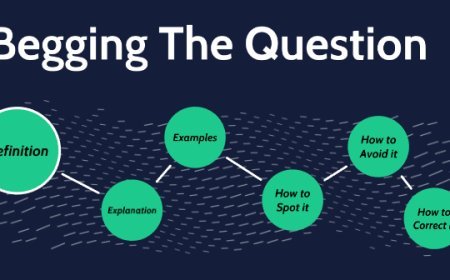The Art of Distraction
The Red Herring fallacy is a deceptive tactic used to divert attention from the main issue or argument by introducing an irrelevant topic. Instead of addressing the core claim, the arguer deliberately shifts the discussion to something else, hoping the audience will follow the diversion and forget or overlook the original point. This fallacy is essentially a smokescreen, designed to throw an opponent off track or to avoid scrutiny of a weak argument.

The name "red herring" comes from the historical practice of using a smoked herring (which has a strong, distinctive smell) to distract hunting dogs from the scent of their prey. In rhetoric, the strong, distracting "smell" of the irrelevant topic pulls the audience's attention away from the real issue at hand.
The Core Mechanism of the Red Herring
The structure of a Red Herring typically looks like this:
- Topic A is being discussed.
- Arguer introduces Topic B (which is irrelevant to Topic A).
- Arguer then shifts focus to Topic B, abandoning Topic A.
The key to identifying a red herring is its irrelevance. While the introduced topic (Topic B) might itself be important or interesting, its introduction serves no logical purpose in addressing Topic A. It doesn't contribute to the argument's validity, refute a premise, or support a conclusion related to the original point. Its sole function is to change the subject.
The wordings that often accompany a Red Herring can be subtle, making the transition seem natural. They might include:
- "That's important, but what about...?" (followed by an unrelated topic)
- "While we're talking about X, let's also consider Y..." (Y being irrelevant)
- "You bring up Z, but isn't the real problem A?" (A being a new, unrelated problem)
- "Sure, but you also have to realize..."
- "My opponent talks about [original topic], but they're ignoring [irrelevant topic]!"
- "We should be focusing on the real issues, like..."
These wordings attempt to smoothly pivot the conversation, making the listener believe the new topic is somehow connected or even more important, when it's not.
Examples of the Red Herring Fallacy
Red herrings are common in various forms of debate, especially where a speaker wants to avoid addressing difficult questions or exposing weaknesses in their own position:
-
Political Debates and Speeches:
- Original Issue: "The mayor's proposed budget contains massive cuts to public education, which could negatively impact our children's future."
- Red Herring: "My opponent talks about education cuts, but let's remember that our police force is underfunded, and crime rates are rising! We need to ensure the safety of our citizens first and foremost."
- Analysis: While police funding and crime rates are important issues, they are separate from the specific budget cuts to education. The speaker introduces a new, emotionally charged topic to distract from the education cuts criticism. The wordings shift from "education cuts" to "police force" and "crime rates."
- Another Example: "We need to address the rising cost of healthcare and ensure everyone has access to affordable medical care."
- Red Herring: "Why are we always talking about healthcare? What about the rampant illegal immigration that's straining our social services? That's the real crisis facing our nation!"
- Analysis: Immigration is a distinct issue from healthcare reform. The speaker introduces a controversial topic to deflect from the original discussion.
-
Everyday Arguments and Discussions:
- Original Issue: "You haven't done the dishes in a week, and it's your turn!"
- Red Herring: "Yeah, but you never take out the trash, and that's been piling up for days!"
- Analysis: While the trash might also need attention, it doesn't excuse or address the failure to do the dishes. It's a deflection tactic. The wordings quickly pivot from "dishes" to "trash."
- Another Example: "I'm concerned about your excessive spending on impulse purchases; it's hurting our savings goals."
- Red Herring: "Well, at least I'm not addicted to social media like you are! That's a real problem."
- Analysis: The social media addiction, while potentially a problem, is irrelevant to the discussion about impulse spending.
-
Business and Corporate Communication:
- Original Issue: "Our company's sales figures have dropped dramatically over the last quarter, indicating a problem with our marketing strategy."
- Red Herring: "Yes, but our customer satisfaction scores are at an all-time high! We're clearly doing something right for our clients."
- Analysis: While high customer satisfaction is positive, it doesn't address the specific issue of declining sales or the effectiveness of the marketing strategy. It's an attempt to distract from a negative metric with a positive, but unrelated, one. The wordings attempt to connect the two ("doing something right") when the connection is weak.
-
Scientific or Academic Debates (less common in rigorous peer review, but can appear in public discourse):
- Original Issue: "The new research strongly suggests that climate change is primarily human-caused."
- Red Herring: "Scientists can't even agree on what the weather will be like next week, so how can they predict climate decades from now? They're just always changing their minds."
- Analysis: Disagreement on short-term weather forecasts is irrelevant to the consensus on long-term climate trends, which are based on different methodologies and data. The wordings misrepresent the nature of scientific consensus.
Why Red Herrings are Persuasive (and Dangerous)
Red herrings are effective because they:
- Exploit Emotional Triggers: They often introduce topics that are emotionally charged or highly relevant to the audience, making the distraction more appealing than the original, perhaps drier, subject.
- Create Confusion: By shifting the topic, they can disorient the opponent and audience, making it harder to track the original argument.
- Allow Evasion: They provide a convenient escape route for someone who can't effectively respond to the original criticism or question.
- Time-Consuming: Addressing the red herring can consume valuable time and energy that should be spent on the real issue.
- Appear Relevant: Sometimes, the distracting topic is superficially related to the original, making the pivot seem less jarring. The wordings might try to forge a tenuous link.
The danger of the red herring fallacy is that it derails productive discussion and prevents meaningful resolution of issues. By constantly shifting the goalposts, it makes it impossible to reach conclusions or make informed decisions. It undermines logical discourse by prioritizing evasion and misdirection over honest engagement with ideas. In critical contexts, like policy debates, it can prevent necessary actions or lead to decisions based on incomplete or irrelevant information.
Identifying and Countering the Red Herring
To identify a Red Herring, pay close attention to the wordings that introduce new topics. Ask yourself: Is this new topic directly relevant to the original argument? Does it help to prove or disprove the original claim? If the answer is no, then it's likely a red herring.
To effectively counter a Red Herring fallacy:
- Point Out the Irrelevance: Clearly state that the new topic is unrelated to the original discussion.
- Example Counter: "That's an interesting point about police funding, but it doesn't address the proposed cuts to education in the budget we're discussing."
- Using "wordings" to highlight the irrelevance: "Your wordings have shifted the subject entirely. Let's get back to the original point."
- Re-focus on the Original Topic: Bring the conversation back to the issue at hand, refusing to engage with the distraction.
- Example Counter: "We can discuss immigration later, but right now, we're talking about healthcare costs. Let's stay on that topic."
- Insist on an Answer: If the red herring was used to evade a question, re-ask the original question directly.
- Example Counter: "You're trying to change the subject. My question was about why the budget proposes cuts to education. Can you answer that?"
- Acknowledge (Briefly) and Dismiss: You can briefly acknowledge the new topic's general importance but immediately dismiss its relevance to the current discussion.
- Example Counter: "While the state of our police force is undoubtedly important, it's a separate issue from the specifics of the education budget cuts. Let's return to the budget."
- Call Out the Fallacy (Optional): If appropriate, you can name the fallacy explicitly.
- Example Counter: "That's a red herring. You're trying to distract from the real issue."
By steadfastly refusing to be pulled off topic and by continually redirecting the conversation back to the main argument, you can neutralize the effect of a red herring and keep the discussion focused on what truly matters. This ensures that arguments are evaluated on their merits, not on clever diversions.
-------------------------------------------------
Want to know more about fallacies? Click here to read about False Dilemma Fallacy
What's Your Reaction?
 Like
0
Like
0
 Dislike
0
Dislike
0
 Love
0
Love
0
 Funny
0
Funny
0
 Angry
0
Angry
0
 Sad
0
Sad
0
 Wow
0
Wow
0





















